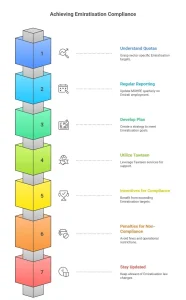Given the dynamic employment context in the United Arab Emirates (UAE), a knowledge of the Emiratisation rules in UAE is of great importance for both employers and job-seekers. These laws are in the UAE’s strategic plan to enhance the percentage of the Emirati workforce in the private sector. This will bring more balance and diversity to the economy. And following the implementation of the Emiratisation rules, business operations and workforce planning have become the most critical factors that must be in consideration in the process of employment relationships in the UAE.
In this article, we will review deeply the core of Emiratisation policies in the UAE. Also, we will look at the recent updates on the same and their implications on local businesses and Emirati job seekers at large. From the time the foundational Emiratisation rule was passed till the new Emiratisation rule in the UAE was introduced in the UAE, we have worked hard to offer you a complete review that clarifies the laws.
Understanding Emiratisation Rules in the UAE
The rules of Emiratisation in the UAE should be clear for businesses and job seekers. This is to navigate the UAE labor market efficiently.
- Emiratisation Rules UAE: These are the UAE Government regulations that require a company to have a certain percentage of its staff as UAE citizens. It extends to firms in several industries throughout the nation.
- New Emiratisation Rule in UAE: The government has lately amended these regulations. Therefore, imposing higher ratios of Emiratis in specific occupational sectors. And also introducing positive and negative incentives for compliance and non-compliance.
- Sector-Specific Targets: The Emiratisation rule is different by industry. With special targets for banking, insurance, and core sectors. Companies are going to plan to fulfill these sectoral goals.
- Training and Development: A substantial part of the Emiratisation initiative includes training and development of the Emirati Employees who are given a chance to acquire the necessary skills that match their positions.
- Compliance Benefits: Companies that fulfill the Emiratisation goal of the government may receive benefits. For example, faster processing of work permits and possibly financial aid.
- Penalties for Non-Compliance: Those companies falling short of the Emiratisation standards will get a fine, and they may even have restrictions on their business operations.
Compliance is pivotal for companies working in the ruling of the UAE. Emiratis have to be aware of these rules while looking for jobs. The Emiratisation drive by the government is their way of dedicating to building an economy that has long-term stability. Also, an economy of diversity for the benefit of the UAE residents.
Emiratisation Quotas: Compliance Guidelines
Here are the key compliance guidelines for Emiratisation quotas:
- Understand the Specific Quotas: Each sector has its own Emiratisation quota set. The banking sector and insurance companies have their own requirements for reserve ratios.
- Regular Reporting: Organizations must update MOHRE quarterly. This entails mentioning the number of Emirati employees, their positions within the company, and the Emirati managers as well.
- Develop an Emiratisation Plan: Businesses must have a one-page plan as to how they would achieve their Emiratisation targets. This plan can cover employment strategies, training programs for Emiratis, and associating with educational institutions in order to hire graduates.
- Utilize Tawteen Services: The Tawteen Council offers services to firms to aid them in fulfilling their Emiratisation targets. Moreover, they include a database of Emirati professionals, career events, and training modules, among other services.
- Incentives for Compliance: Entities that surpass their quota of Emiratisation may be eligible for incentives. The incentives, which aim to motivate companies to proactively take part in the Emiratisation program, have this goal.
- Penalties for Non-Compliance: Firms that do not meet Emiratisation quotas will be subject to penalties that could affect them financially. When the companies do not obey the regulations, their work might need to stop.
- Stay Updated on Changes: Announcement of the Emiratisation law may result in changes in quotas and compliance requirements in UAE. Moreover, companies should not only be aware of updates but be in compliance with the ongoing measures.
Implementing these guidelines will allow businesses to avoid the penalties as well as integrate into the more diverse UAE economy.
Sectoral Targets and Regulations for Emiratisation
Here is a closer look at how Emiratisation has an application across different sectors:
- Banking and Finance: The sector has one of the highest Emiratisation target rates for demonstrating the strategic role of this industry in the UAE economy. Banks are bidding to abide by the requirement of having more Emirati employees.
- Insurance: Similarly, the insurance industry is greatly affected by the demand for exact Emiratisation quotas, same as banking is. The attention is on jobs that open the door for career advancement and skill development in the Emirati professionals.
- Information Technology (IT) and Telecommunications: The UAE’s push for a global tech hub means that there is a growing tendency for the involvement of the Emirates in IT and telecommunications. This is among the jobs that are in cybersecurity, network engineering, and software engineering.
- Healthcare: The healthcare sector is incentivized to employ Emirati professionals in different capacities. Including medical practitioners, administrative and support roles, to sustain and guarantee the sector’s resilience.
- Education: Emiratization in education aims at not only raising the number of Emirati teachers and faculty members but also devising ways to engage Emiratis in leadership positions in educational institutions.
- Retail and Hospitality: Although the staffing requirements in these sectors are lower than the bank or IT departments, there is a growing tendency for the locals to occupy the customer-facing roles and management positions.
- Oil and Gas: The national economy is critical, especially for the localization of the oil and gas sector.
- Compliance and Monitoring: MOHRE closely supervises the compliance of these key sectors with these targets. This while assisting the companies in achieving their Emiratisation objectives.

Job Categories and Priority Roles under New Emiratisation Rules
The Emiratisation law by the UAE government has categorized some job positions and roles with a priority to integrate Emirati nationals into the workflow. The aim is to guarantee that the placements into the right positions have Emiratis across different sectors. Here is a breakdown of the focus areas:
- Firstly, Leadership and Managerial Positions: Appreciation is on building an Emiri culture in leadership where Emiratis will occupy managerial and executive positions for mentorship and growth.
- Secondly, Specialized Technical Roles: There is a drive for Emirati specialists to occupy positions demanding specific technical skills. Especially those with a connection with technology, engineering, and health, where knowledge plays a key part.
- Thirdly, Financial and Administrative Jobs: The new Emiratisation rule in the UAE ambitiously pursues Emiratisation in finance and administration positions. This is achieved by using Emirati employees’ knowledge of the local business practices.
- Moreover, Customer Service Positions: Emiratisation of customer service roles is being considered in such a way that UAE government and private sectors could deliver services that are aligned with the UAE cultural values and standards.
- Furthermore, Human Resources: Emphasis is laid on the employees who are Emiratis for having expertise that will help them plan their strategic workforce and support the nationalization movement of the employees in organizations.
- Lastly, Innovation and Research: Motivating UAE nationals to perform innovation, research, and development roles is the pivot strategy to steer the country towards the goal of a knowledge-based economy.
Recruitment and Employment Practices for Emiratisation
- Firstly, Tailor Recruitment Efforts: The recruitment process for the companies should attract Emirati candidates. These include local media advertising, government job fair participation for Emiratis, and university partnerships.
- Secondly, Offer Competitive Packages: Businesses should offer salary packages and career development opportunities if they want to attract Emirati talent. These should be in line with the market standards, if not above.
- Thirdly, Implement Internship and Training Programs: Offering internship and training programs that are directly to Emirati students and graduates can be a very useful tool for them to get real-world work experience and skills. This will make them more attractive for permanent positions.
- Additionally, create a Supportive Work Environment: Creating an organizational culture that is based on the fact that the values and practices of the UAE are honored and integrated is one of the imperative steps for keeping the Emirati employees in an organization. Also cover this one like noting cultural holidays, dress codes, and prayer spaces.
- Furthermore, Develop Clear Career Pathways: The career progression paths of the nationals should be clear. Mentoring and leadership training programmes are geared towards the preparation of female employees to hold senior managerial and leadership positions in the organization.
- Moreover, engage with Emiratisation Support Services: The Ministry of Human Resources and Emiratisation (MOHRE) and other relevant government bodies are involved in such a provision of support services. This includes the task of matching employers and Emirati job seekers.
- Lastly, Monitor and Evaluate Emiratisation Efforts: Companies need to apply a kind of regular monitoring of their Emiratisation strategies. The purpose of this is to assess effectiveness and make necessary adjustments.
Training and Development Programs for Emiratisation Compliance
Training and development programs are the two vital parts of the Emiratisation Compliance. Moreover, this helps overcome the nationalization myth and ensures Emirati nationals are not only hired but also empowered to succeed in their positions. You must know that hiring Emiratis could assure you a future of diversity and success.
Such programs are skillfully developed to improve the level of competencies, knowledge, and skills of Emiratis, the same level of competencies being the measure of success of their employers, and the economic goals of the country. Here are key aspects to consider:
- Firstly, Identify Skill Gaps: Employees’ skill gaps should have an identification within the workforce. Also, the specific needs of their Emirati employees should be taken into account. The training will be specific and productive to achieve the goal.
- Then, Offer On-the-Job Training: On-the-job training is invaluable. It allows the employment of Emiratis and gaining real-world skills, as well as practicing what has just been learned.
- Likewise, Provide Leadership and Management Training: The ability to develop leadership skills is a necessity for setting up Emirati nationals for these managerial and executive roles, a direct link to the focus on Emiratisation that revolves around leaders.
- Additionally, Implement Mentorship Programs: Accompanied by experienced mentors in the organization, Emirati personnel can be trained to know the job, enhance their career, and grow their position in the organization.
- Furthermore, Utilize External Training Providers: Working with external training institutions/providers will offer you high-quality training in industry specifics.
- Moreover, Encourage Continuous Learning: By creating a culture of lifelong learning and career development, Emirati employees can be enticed to continue with further education and training. This empowers them with better career perspectives.
- Lastly, Monitor and Evaluate Training Outcomes: A continuous evaluation of the training and development programs is essential.
Incentives for Employers in New Emiratisation Rules
Here are some of the key incentives available under the new Emiratisation rules in the UAE:
- Firstly, Reduced Fees: Companies that successfully achieve or even exceed their Emiratisation targets could benefit from lower charges for work permits and other government services. This has the potential of resulting in huge cost savings in more especially for companies with large employee.
- Then, Priority in Government Contracts: Companies with a solid track record of Emiratisation are likely to receive advantages when bidding for government contracts. Not only does this give an edge over the competition, but it also brings fresh sources of revenue.
- Also, Enhanced Support Services: MOHRE and other government bodies’ provision of enhanced support services can provide the Emiratization process with better recruitment and training of Emirati staff members. This also covers personalized assistance and exploration of job fairs and recruitment events.
- Additionally, Public Recognition: Organizations that stand out with their visible and outstanding engagement in Emiratisation could be rewarded and recognized publicly. This can help to build brand goodwill, leading to more customers and potential employees.
- Furthermore, Increased Visa Quotas: The Emiratisation targets of business entities that need a large number of expatriate employees can help them to get the quotas for their visas. This will be a factor in the recruitment of international talent for the roles that cannot be filled locally.
- Moreover, Flexibility in Labor Regulations: It is possible for some compliant firms to be flexible with labor regulations.
- Lastly, Financial Grants and Subsidies: Certain industries can benefit from conditional grants or subsidies to cover part of their training expenditure and create Emirati jobs.
The government of UAE utilizes these incentives to demonstrate its willingness to create a win-win for both local and foreign businesses and Emirati job seekers.
Compliance and Reporting Obligations under Emiratisation Rules
Here is a breakdown of what companies need to know:
- Firstly, Regular Reporting: Organizations, including the details of their Emirati workers as a percentage of the total workers, and their positions within the company, need to submit such reports regularly. This regularly incorporates giving updates on the recruitment, education, and retention of Emirati employees.
- Then, Maintaining Records: Enterprises must keep the relevant and up-to-date information on their localization policies. This encompasses recruitment documents such as those with a relation to the hiring process, training programs, and any other missions aimed at promoting Emiratisation.
- Likewise, Meeting Quotas: Employers have to conform to the Emiratisation limits applicable to their industry or sector.
- Additionally, Utilizing Approved Channels: Use of the licensed channels and platforms by the MOHRE or other relevant authorities is obligatory when companies report Emiratisation metrics.
- Furthermore, Transparency in Employment Practices: Organizations need to practice transparency throughout their procedures, namely during recruitment, training, and promotion of Emirati citizens. This includes equal opportunities for Emiratis and administering the employment behavior according to fair practices.
- Moreover, Participation in Audits: The companies might face audits by MOHRE or other government bodies. Enterprises need to provide all the necessary documents and proof of their Emiratisation work during these audits.
- Lastly, Continuous Improvement: Besides just fulfilling the lower-level requirements, companies need to keep on upgrading their Emiratisation strategies.
Support Services for Emirati Job Seekers: Guidelines
The UAE government provides different support services for Emiratis who are seeking jobs, targeted at ensuring that they are able to get into and progress within the workforce. These services are devoted to the Emiratisation system, which offers Emiratis the necessities to find productive employment. Here are some guidelines on accessing and utilizing these support services:
- Firstly, register with Tawteen: Emirati job seekers should sign up with the Tawteen Council. This is the key responsible authority for Emiratisation. Tawteen provides career counseling, employment matching, and training programs.
- Secondly, Attend Job Fairs: Engage in job fairs and recruitment events targeting Emiratis only. This way, students can find the opportunity to meet employers and learn about open jobs.
- Thirdly, utilize Career Centers: There are also many universities and educational institutions with career centers that provide useful resources and assistance for those looking for jobs. Such as workshops on writing resumes and courses in interview preparation.
- Additionally, Explore Online Platforms: Benefit from job boards and websites that deal with vacancies meant for the Emirati community. Here, platforms list positions in various sectors and industries.
- Furthermore, Mentorship Seek mentorship programs that match Emirati job-seekers with industry professionals who have experience that matches their own field of interest. Mentorship is beneficial in that it offers you good advice and insights, and also some networking opportunities.
- Moreover, engage in Continuous Learning: Explore the available training and development opportunities. Life-long learning leads to self-improvement, which makes you a more valuable asset to the company.
- Lastly, Stay Informed: Follow the lead in the changing scenario in the Emiratisation program. If you comprehend the government’s priorities, you can align both your job search and career goals to them.
Emiratisation Rules Demystified: Your FAQs Answered
Why are New Emiratisation rules important?
Here are why these new rules are important:
- Firstly, Boosting National Employment: The main purpose of the Emiratisation labour regulation is to enhance the rate of Emirati employment in the private sector, therefore reducing the dependence on foreign labor. And, subsequently, the development of the country.
- Subsequently, Enhancing Skills and Competitiveness: Emiratization rules are not only meant to provide jobs for the citizens in different sectors. But also to equip them with the necessary skills to perform in these sectors. This is vital for the formation of a market economy that is able to innovate and adapt to global changes.
- Also, Promoting Economic Diversification: The UAE’s strategy for economic diversification is very much driven by venturing beyond the oil and gas industries. The integration of Emiratis into the instrumental positions in different industries that empower growth and innovation achieves this goal.
- Additionally, Strengthening Social Cohesion: Emphasizing on the Emiratization across all sectors is a critical factor for social harmony and national identity building. It guarantees that economic growth benefits the citizens evenly, hence creating a feeling of being part of the community and of self-worth.
- Furthermore, Attracting Investments: The factor that makes foreign investors invest in countries is a diverse workforce. Through Emiratisation, the UAE nationalizes the workforce. Therefore, they increase the attractiveness of the country as a business destination.
- Moreover, setting a Regional Example: The UAE’s Emiratisation policy that is proactive comes as a good example for other Gulf states that are also struggling to achieve workforce nationalizing. It emphasizes UAE as a leader on regional economic reform and workforce development.
- Lastly, Ensuring Sustainable Development: The Emiratisation rules in the UAE are now in alignment with the UAE’s vision for the future development, which is based on the concept of a renewable economy.
How are Emiratisation quotas determined?
These quotas are precisely determined through a process of strategic planning, economic evaluation and social considerations. Here’s an insight into how these quotas are established:
- Firstly, Sector Analysis: It starts the process with a comprehensive analysis of different economic sectors of the UAE. Authorities define industries with high-growth potential, strategic importance and those that may be enhanced through Emirati participation.
- Then, Labor Market Studies: There is detailed labor market research conducted to analyze present level of Emirati employment in various industries. These studies pinpoint weak points and new venues for enhancing the Emirati employee’s involvement.
- Also, Economic Goals Alignment: Quotas are a component of the UAE economic diversification strategy, aiming at reducing oil revenue dependency, increasing innovation and support for the knowledge-based economy. That pursuance of Emiratisation goals supports the overall economic development is guaranteed by this.
- Additionally, Consultation with Stakeholders: The government does consultations with different parties such as private sector, education sector and industries so as to be able to understand the challenges and opportunities in achieving the Emiratisation goals.
- Furthermore, Skill Gap Identification: Finding out the missing skills in workers is paramount. Quotas are set to stimulate Emirati students to choose relevant fields of study which will help the country to address the shortage of skilled professionals in key areas.
- Moreover, Gradual Implementation: Quotas are often introduced incrementally to give employers enough time to adjust their recruitment practices and come up with the strategies that will help retain and attract Emirati talent.
- Lastly, Regular Review and Adjustment: Emiratization quota is not a static concept; it is frequently reviewed and revised based on different economic situation, the success of the existing initiatives and demographic changes. This guarantees that the quotas remain useful and functional in the process of their purpose realization.
What are the key job categories prioritized under Emiratisation rules?
- Banking and Finance: Technically, this division is a major target of the Emiratisation efforts, with particular concentration on jobs like financial analysts, investment advisors, and banking service managers.
- Information Technology (IT): The digital transformation of the economy leads to the shortage of skilled workers in the IT sector, such as software developers, cybersecurity specialists, and network administrators. Emiratization is driven by the need to enhance the involvement of Emiratis in this innovative & growing sector.
- Engineering: This category includes a number of concentrations, which are cross-cutting and include civil, mechanical, and electrical engineering, and are, among others, used in the construction, oil and gas, and renewable energy industries.
- Healthcare: It is important to emphasize that medical professionals, for example, doctors, nurses and pharmacists, are high priority, so that the healthcare system retains the core of Emirati nationals’ skills and cultural awareness. Another point of emphasis is on science roles and public health careers that can help with better healthcare outcomes.
- Education: Teachers, school supervisors, and academic advisors play the leading role in making the future generations. Emiratisation in education is a process, which provides humanization in the curriculum and methodology.
- Legal and Compliance: Legal professionals constitute lawyers, legal advisors and compliance officers among others and they play a crucial role in the governance of the UAE, enforcement and legal regulations. A rise in the number of Emiratis in such roles also serves the purpose of ensuring a strong legal system.
- Media and Communications: This includes journalist’s, public relations and digital media’s jobs. The objective of the Emiratisation initiatives in the media is the amplification of national identity and cultural values through media and communication.
What support services are available for Emirati job seekers under Emiratisation rules?
Emiratis have a wide range of support services provided to them by the Emiratisation legislation that aid them to increase their chances of getting a job. These services aim at filling the gap between Emirati professionals and the job market and getting them well-prepared and ready for competition. Here are the key support services available:
- Firstly, Career Counseling: Career advisers give direction on career areas of study, linking skills and interests of students with job market requirements.
- Subsequently, Resume Workshops: Pros help Emiratis design their resumes in such a way that they attract their potential employers.
- Thirdly, Interview Preparation: Practicing mock interviews and coaching sessions prepare job seekers for effective interviews.
- Additionally, Job Matching Services: Platforms matching Emirati job seekers with the vacancies that are in the sector on the priority list.
- Furthermore, Training Programs: Skills development tailored to individual job seekers is in high-demand areas.
- Moreover, Internship Opportunities: Internships provide students with hands-on experience, thus setting them apart from other candidates.
- Also, Entrepreneurship Support: Guidance and resources are provided for those Emirati citizens who are interested in starting their own business.
- Lastly, Continuous Education: Scholarships and programs are geared towards building lifelong learners and professionals.
Such tools enable Emiratis to find a job, making sure they have the instruments and necessary assistance to succeed in the extremely competitive UAE job market.
What are the penalties for non-compliance with Emiratisation rules?
Companies that are noncompliant with UAE nationalization rules will have to face the government’s set penalties. Emiratisation process is monitored by these measures, so that businesses are given this task. Here are the penalties for non-compliance:
- Firstly, Financial Fines: The fines are imposed on companies for missing the mandatory Emiratisation quotas.
- Business Restrictions: Contrarily, those companies that failed to comply may have restrictions on their business operations.
- Work Permit Limitations: The quotas on issuing or renewing work permit for expatriate workers could be limited.
- Additionally, Public Sector Tenders: Non-compliant companies or organization may lose the right to bid for public sector contracts.
- Furthermore, Reputation Impact: The names of the non-compliant businesses are published in public and this is a negative on the business reputation.
- Moreover, Visa Quota Reductions: Companies may see the number of visa allocation for foreign workers is reduced.
- Lastly, Increased Scrutiny: The non-compliant companies can expect to be scrutinized more regularly, through audits and inspections.
Let Us Handle Your Emiratisation In Dubai
Managing the intricacies of Emiratisation in Dubai can be difficult for those businesses which are trying to adhere to the UAE laws on nationalization. That is when Emiratisation Nafis enters the picture. Our capabilities and solutions are custom crafted to be easy to use, therefore, your business not only complies but overachieves Emiratisation mandates. Here is how we can assist:
- Firstly, Comprehensive Consultation: We begin with obtaining comprehension of your company necessities and carrying out an evaluation of the current Emiratisation situation.
- Tailored Strategy Development: Our experts create a personalized Emiratisation strategy according to your business aims.
- Thirdly, Recruitment Support: We work closely with you to fill your representative and diverse Emiratization needs.
- Additionally, Training Programs: Our employee training programs cover everything from basic understanding of the role to advanced skills development and productivity improvement.
- Furthermore, Compliance Management: We make sure your business not only adheres to the UAE-Emiratisation regulations, but goes beyond that.
- Moreover, Continuous Support: At Emiratisation Nafis we ensure our clients continue to receive support and updates on Emiratisation and any changes in Emiratisation regulations.
- Lastly, Reporting and Documentation: We manage and submit all necessary documents and reports to prove that we meet the Emiratisation requirements.
Let Nafis Emiratisation Emirates do your Dubai Emiratisation. Our team makes sure that not only your enterprise complies with the Emiratisation policies of the UAE, but also receives the advantages coming from the participation of Emirati talent in the organization. Join us in this voyage and let us handle the Emiratisation process together with comfort and confidence.
Conclusion
In summary, Emiratisation rules in the UAE are a deliberate strategy to involve UAE nationals in the labour force. These rules are developed to promote a diversified and sustainable economy, upgrading the workforce skill-set of the Emiratis, and ensuring their active part in the economic development of the country. Taking into consideration the rules and regulations for the companies that are operating in the UAE is not only a legal obligation but an opportunity to become a part of the vision for the nation and be able to access the local expertise.
Emiratisation landscape is many-sided and it involves several quotas, targeted job categories, and special services for Emirati job seekers. Yet, penalties for non-compliance remind us of the necessity of following these norms. Companies that want to rise up in this competitive environment will find that it is more manageable to work with the experts, such as Emiratisation Nafis, who will help in ensuring compliance and a positive impact on their operations as well as the economy at large.
We, at Emiratisation Nafis, want you to be successful in your journey towards aligning your business with the Emiratisation goals in Dubai. By applying our range of services, which covers consultation and strategy development to employee recruitment and compliance management, your business will not only be legally compliant but also will have a lot of Emirati talent to drive the success.
For more details about the services that we offer and how we can help with your Emiratisation process, you can reach us on +971 4331 6688 or via email at [email protected]. We are here to deliver the necessary support and required expertise that your business needs to successfully satiate its needs in the UAE’s competitive business environment. Get to know more about us!
FAQs for Emiratisation Rules
Q1: What is the goal of the Emiratisation strategy in the private sector?
Boosting UAE nationals’ participation in private companies is the main goal.
Q2: What compliance essentials must businesses meet?
Employers must meet compliance requirements. It includes:
- Sector-specific quotas
- Report regularly to MOHRE
- Accurate records
- Use approved recruitment channels, and
- Demonstrate fair practices
Q3: Are there incentives for companies meeting Emiratisation targets?
Absolutely! Compliant firms enjoy many perks. They experience reduced fees and priority in government contracts. They can also avail better support services, public recognition, and financial subsidies.
Q4: How does Nafis assist employers with the Emiratisation process?
Nafis helps employers with tailored strategies. It also assists with recruitment support. Businesses get training programs and reporting. It helps employers in exceeding targets and benefits from incentives.
Q5: What are the results of not complying with Emiratisation?
Not complying results in heavy fines. Moreover, businesses may face restrictions and reduced visa quotas. It may also cause exclusion from government contracts.



